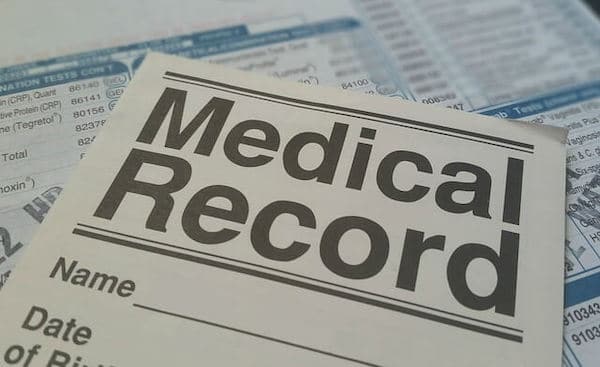Medical Background Check – How Far can Life Insurance Companies Go?

You apply for life insurance only to find out they want much more information than you ever realized.
Did You Try Out Our Life Insurance Quote Comparison Tool? Save BIG!
Not only are you disclosing information about your health, but you have to answer questions about your health history and provide to back it up.
It seems like a lot – life insurance companies want everything, including your blood and urine, during your medical exam.
When will it end? While it seems overwhelming, life insurance companies insure your life. If you die, they must pay out your death benefits. They must make sure anyone they insure is a ‘good risk’ and isn’t going to die prematurely.
Note that:
FREE Quotes, No Obligations!
Life insurance companies use the information you provide in your medical exam and your medical history to rate applicants based on their chances of dying within a specific timeframe. Oftentimes, this means pulling your medical records to get the full story.
Insurance companies use your medical records in addition to other factors, such as a medical exam and family history, to determine your eligibility for life insurance.
Just how far can life insurance companies go with your information? We look at the factors below.
What can Life Insurance Companies Access?
Life insurance companies may only access your medical records if you provide written consent. If you grant permission, they can see a variety of information, including:
Doctor visits – the reason and the diagnosis
Any prescribed medications
Any referrals provided by the doctor
Life insurance companies can access the records directly from your physician. But they can also get the information from the Medical Information Bureau (more on this below) and your prescription records.
Compare life insurance quotes and save!
They use this information to decide if you’re a good risk for insurance. Combined with the information from your medical exam and the answers on your application, insurance companies ‘rate you’ based on your health, which determines your policy’s premiums, if you’re approved.
Underwriters use the information found in the medical records to ask more questions or ask for more documents. Sometimes they uncover something they didn’t know before reading the records that may change how they rate you or even whether they will approve your application.
Life insurance companies can’t directly share your medical information with others, but they can report it to the Medical Information Bureau if they are members.
Think of the MIB as the credit reporting agency of life insurance. If you apply for insurance through an MIB member and they turn you down for insurance, they must report the reasons to the MIB. This leaves information for future insurance companies regarding your overall health. It’s just like if you paid a bill late, and it reports on your credit report for future lenders.
You’ll know when you apply for life insurance if the agency pulls your MIB report because you have to provide your consent for them to do so. They can’t pull it without your approval.
Why do Life Insurance Companies Check this Information?
Life insurers check your medical records to make sure the information you provide coincides with your medical records. They also use this information to ensure you don’t omit any information from your application.
You may not purposely omit information, sometimes issues slip your mind, or you weren’t made aware of everything the doctor noted in your records. Life insurance companies use this information to make sure you are at a good risk. But they also use it to see if anyone committed insurance fraud and lied on their application.
What do they Look For? How Far Back Do They Look?
Insurance companies use your medical records to look at your health history. They are looking for significant health issues you may have had in the past, such as:
High blood pressure
Heart disease
Stroke
High cholesterol
Diabetes
Immune disorders
You should disclose these things on your application, but insurance companies look at your medical records to verify what you have revealed.
This is interesting:
If the insurance company takes information from the MIB, they can see as far back as 7 years. If they get the records straight from your doctor, they may not ask for documents that go that far back – it depends on the information on your application. They may request records from a few years back if they have concerns.
Are there Privacy Laws?
Insurance companies can’t share your medical information with anyone but the MIB. The federal Health Insurance Portability and Accountability Act protects your private information from being transferred to unauthorized individuals and companies. It requires anyone that handles your data and transmits it to exercise caution.
You’re also protected by the Department of Health and Human Services privacy rules regulating your health information.
The insurance company cannot access your medical records if you don’t consent.
What Happens if You’re Turned Down for Insurance?
If the life insurance company declines your life insurance application, you have the right to know why. You can ask for your medical exam results and/or the reason for the declined application.
Sometimes insurance providers rate you lower than you may think you should be. You have the right to dispute the rating and ask for further testing or the insurance company to review more medical records to reconsider the rating and/or approval.
If you want a reasonable price on life insurance, you must share your medical records. Fully underwritten policies have the lowest premiums and the highest coverage. If you don’t provide your documents and/or undergo a medical exam, you may still get insurance but at higher rates and lower coverage amounts. Simplified life insurance and guaranteed acceptance insurance may not require as much information but provide lower coverage amounts and higher premiums.







